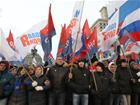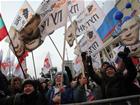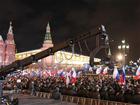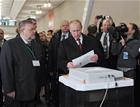Beyond the Protests: the Opposition and the Beneficial Zeitgeist in Russia
Dragomir Ivanov, March 13, 2012
 A month before the presidential elections in Russia, expectedly won by PM Vladimir Putin, his main opponent Mikhail Khodorkovsky wrote in Novaya Gazeta newspaper: “Those elections are a combat of symbols and not a real opportunity for the people to choose their constitutional champion. It is important to show where we want to go as the real challenge will come after 4 March.”
A month before the presidential elections in Russia, expectedly won by PM Vladimir Putin, his main opponent Mikhail Khodorkovsky wrote in Novaya Gazeta newspaper: “Those elections are a combat of symbols and not a real opportunity for the people to choose their constitutional champion. It is important to show where we want to go as the real challenge will come after 4 March.”
Days before 4 March novelist Grigory Chkhartishvili, whose alias is Boris Akunin, explained in his blog why he would vote for no one of the five candidates: “The opposition movement has not yet matured for joint actions. It is not surprising if we take into account the tender 3-month age of our civil society”, says Akunin who was one of the respected figures during the protests, provoked by reports of manipulations at the Duma elections in December.
Khodorkovsky, who is stranded in a penitentiary colony and the master of intellectual criminal novels Akunin voiced the main conclusion from the elections in Russia. It is: the sooner the opposition energy focuses on a joint, purpose-oriented and long-term strategy, the bigger the chance for system change would be.
The three-month old freedom and its lessons
During the protests since December 2011 (where optimists saw the beginning of an Arab scenario – a rather overgrown expectation for the Russian environment) we witnessed a few positive, but also a few saddening developments. The surprisingly fast release from the stupor that had seized the majority of the Russians since Vladimir Putin first entered Kremlin in 2000 was positive. The public speech underwent an unexpected renaissance. In only 3 months the heavy (auto) censorship in the Russian media started to crack and for a moment it looked as if the sharp and direct criticism against Mr Putin and his circle were part of the bon ton, a kind of media chic.
censorship in the Russian media started to crack and for a moment it looked as if the sharp and direct criticism against Mr Putin and his circle were part of the bon ton, a kind of media chic.
The reinvented freedom, reminding of the hyper-talking and information fever back in the times of the perestroika, did not succeed, however, to compensate the absence of a well-considered anti-Putin programme. Figures with various interests and motivations emerged at the head of the revolts. In one team, ostensibly, stood people like Edward Limonov, the founder of the National Bolshevik party, chauvinism-inclined lawyer-blogger Aleksey Navalny and some former officials with a mighty appetite for power such as the Vice PM in the period 1997 – 1998 Boris Nemtsov, and Vladimir Ryzhkov, MP 1993 – 2007, who refused a Vice PM appointment offered by Boris Yeltsin. They were joined by former associates of Vladimir Putin such as former PM Mikhail Kassyanov and the finance minister who resigned last September Aleksey Kudrin. The latter two, by the way, contributed the most to discrediting of the opposition and many citizens were left with a bitter taste from a stage performance played by inalterable career hunters.
To some extent an acceptable point of view of political normality was the candidacy of the founder of the democratic party Yabloko Grigory Yavlinksky. However, the opposition had to foresee that the Central Electoral Commission would not have let him participate in the elections. As a matter of urgency an attempt was made then to push forward young entrepreneur Mikhail Prokhorov. He gathered significant support (around 8%) but did not manage to scatter doubts about the origin of his assets and about his true motivation to participate in the presidential contest. Some observers, Mr Akunin among them, commented that Prokhorov restrained himself in every way from attacking Vladimir Putin in order not to spoil his relations with the old new president. The solo act of the 46-year old oligarch left the impression that he rather wished to gain political capital for the future than really fight for power. The same happened with the popular anti-corruption fighter Aleksey Navalny, who announced in December the creation of a political party of his own to participate in the presidential elections, but in the end he did not announce his candidacy.
Ilarionov’s theses – a solid fundament
 An unquestionable success was the co-ordination of the efforts to monitor the elections through the civil association “Voters’ League”. Thanks to its 100 000 web cameras that webcast live what happened in the election sections, tens of thousands volunteers documented the manipulations.
An unquestionable success was the co-ordination of the efforts to monitor the elections through the civil association “Voters’ League”. Thanks to its 100 000 web cameras that webcast live what happened in the election sections, tens of thousands volunteers documented the manipulations.
Beyond election monitoring, however, it became obvious that the opposition did not yet have a programme for its next steps. The “December theses for the citizens of Russia” by economist Andrey Ilarionov, for instance, had no follow-up. The former economic adviser of Vladimir Putin, who left the Kremlin because of disagreement with the state model that he himself described as “a corporate state type”, proposed a detailed plan for “peaceful restoration of the rule of law and political freedom”. The plan provides for establishment of a Civil Movement for taking down Vladimir Putin and Dmitry Medvedev and for a round table to prepare the Founding Assembly for a new constitution of Russia. The Ilarionov’s theses had a strong echo in the online discussion boards and among the expert groups but did not find grounds for development among the leaders of the protests.
Yet, there are still opportuntities for manifestation of the  civil society. The Russian society is currently divided – roughly speaking – into three parts. Almost a third support Mr Putin, another third are against him and the rest is rather apolitical – people who are afraid of changes. Exactly those politically apathetic subjects are the target of forceful state propaganda that implies fall-down in case of an “orange scenario” like that in Ukraine in 2004 – 2005.
civil society. The Russian society is currently divided – roughly speaking – into three parts. Almost a third support Mr Putin, another third are against him and the rest is rather apolitical – people who are afraid of changes. Exactly those politically apathetic subjects are the target of forceful state propaganda that implies fall-down in case of an “orange scenario” like that in Ukraine in 2004 – 2005.
Outrage is fading away, tensions remain
In February, a study by the analytic centre Levada showed that only 19% of Russians would like to see Vladimir Putin president after the elections in 2018. 6% of those questioned said they would support Medvedev and 24% would vote for “another politician”. Levada director Lev Gudkov says the most numerous group (35%) is currently of the people who do not recognise the legitimacy of the elections. He expects the wave of discontent to quiet down gradually but tensions to remain because of the increase of mistrust in the authorities. Inflation eats up quickly the financial indexations that were promised to public servants, a rise of retirement age is also coming up. In the summer, the main consumer prices are expected to rise after they were artificially suppressed at low levels until after the elections.
Most observers agree that the division along the axis “pro Putin” and “anti Putin” will define public life in Russia for months ahead. The reasons are increasingly economic: like all people, the Russians are mostly interested in their standard of life.
A shocking example about the popular attitudes are the mass manifestations, called up in Moscow to celebrate Vladimir Putin’s victory. The participants there were thousands of common, poor Russians who agreed to support the new old president in exchange for a miserable sum of 500 Roubles (around 13 Euros). Even sadder is that most of them remain only with the promise for payment while the money submerge in the pockets of their “brigadiers”.
But those “unpretentious mobbers” are building up a new community in Russia that has the potential to evolve in an anti-Putin majority, journalist Ilya Millstein believes in his article on the opposition website Grani.ru. Amounting to tens, if not hundreds, of thousands of people, they offer their services to whoever is in charge of the mass events in Kremlin. Builders of a “society for mutual use of the people and the power” they are either "pro" or "anti" Putin. They are "pro" themselves and for a small sum of money they are ready to raise up posters to support anyone who pays.
In a couple of years, if the prices of energy supplies do not fall, those dangerously impoverished Russians will multiply to millions. “And one day, all those seemingly rather positive people, who had not received the promised money, will set off to seek explanation from their 'brigadiers'. Looking at this crowd all OMON-people (the special forces) will scatter”, predicts Millstein.
Mr Putin sets manoeuvring tactics
This time Vladimir Putin paid a high price for his victory: through his militant rhetoric and denigration of his opponents he divided the country into two parts, comments Boris Reitschuster, correspondent of the German Focus magazine,
one of the thorough experts on Russia. On the one side those are people who believe that Vladimir Putin is saviour of the nation or at least that he is the lesser evil – those are inhabitants of the province who inform themselves mainly via the pro-Kremlin television and see the new old president as a guarantor of stability and growth.
On the other side are representatives of the newly emerging middle class – people from the big cities who ever stronger raise their voice against the system and associate the “national leader” with stagnation, bureaucratic arbitrariness, corruption and the lack of law order. They are indignant by the arrogance of the Putin-Medvedev switch and by the underhand dealings that secured the victory of the United Russia party at the December elections for the State Duma. Vladimir Putin has added another insult by calling them “agents of the State Department” and anti-HIV fighters with condoms on their lapels. Exactly those citizens are essential component of Russia’s modernisation and now many of them are ready to emigrate, explains Boris Reitschuster.
 During his third presidential term Vladimir Putin will probably seek a path between the protesters and the supporters of his regime. The opposition is to expect manoeuvring tactics with the president trying both to soothe the hardliners in his circle and not to go into extremes with violence. It is logical, that initially he will bring out from the lumber room the promises back from the beginning of Medvedev’s term in 2008 – for economic reforms, the need for innovations etc, in order to temporarily throw dust in the eyes of the internal and external public.
During his third presidential term Vladimir Putin will probably seek a path between the protesters and the supporters of his regime. The opposition is to expect manoeuvring tactics with the president trying both to soothe the hardliners in his circle and not to go into extremes with violence. It is logical, that initially he will bring out from the lumber room the promises back from the beginning of Medvedev’s term in 2008 – for economic reforms, the need for innovations etc, in order to temporarily throw dust in the eyes of the internal and external public.
But the spirit of the protests has already left the bottle in Russia. “In the past years the dried-out political landscape was rather an advantage for Mr Putin. Now, it is the opposite. There is no safety valve for discontent, people go to the streets, they do not believe in the system anymore and do not let themselves be entangled in it”, says Boris Reitschuster. In his opinion, “the Zeitgeist [in German - the time spirit] works against Putin”.
This Zeitgeist might be beneficial but it can also turn out to be a failure. The history of Russia is rich with evil spirits but it has been sometimes inhabited by benevolent ones such as Peter I, Catherine II ... It depends on the citizens who have the courage to push from the inside the bottle’s stopper to cultivate the new spirit.